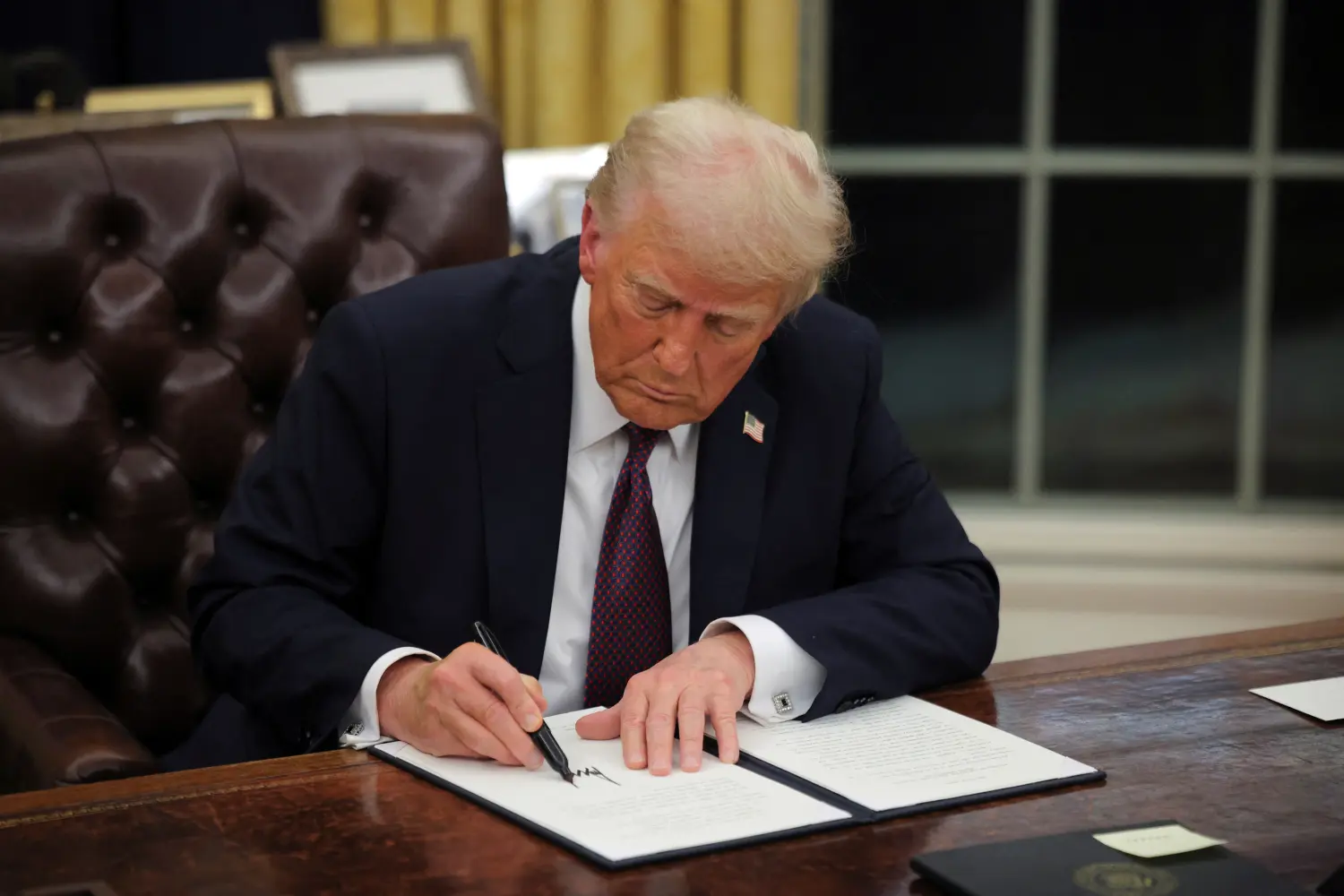Trump’s ‘Big, Beautiful Bill’ Approved: What It Means for Crypto Markets
04.07.2025 7:00 3 min. read Kosta Gushterov
Congress has officially passed President Donald Trump’s landmark economic package, a sweeping bill that combines aggressive tax cuts with deep federal spending reductions.
Dubbed by Trump as his “big, beautiful bill,” the legislation marks the first major legislative victory of his second term.
The House vote, which came after intense negotiations and a record-breaking speech by House Minority Leader Hakeem Jeffries, paves the way for the president to sign the bill into law on July 4 at a special White House ceremony.
Massive Fiscal Shift: Trillions in Cuts and New Debt
The bill is set to slash federal taxes by $4.5 trillion over the next decade. Among the headline measures are the extension of the 2017 Tax Cuts and Jobs Act, as well as new deductions — including zero taxes on tips up to $25,000 and tax-free overtime pay up to $12,500. These changes are designed to boost disposable income for millions of Americans and businesses.
But the other side of the coin is a projected increase in national debt. The legislation could add between $3.3 trillion and $5 trillion to U.S. debt over ten years, sharply raising the debt-to-GDP ratio. This could place downward pressure on the U.S. dollar and spark inflation — macroeconomic conditions that often drive demand for Bitcoin and other cryptocurrencies as alternative stores of value.
Bitcoin’s narrative as “digital gold” typically gains strength in inflationary periods, when investors seek scarce, decentralized assets to hedge against fiat currency devaluation.
Crypto Tailwinds: Disposable Income and Inflation Risks
The combination of rising disposable income and mounting inflation risks creates a potentially bullish environment for cryptocurrencies.
More disposable income may fuel retail investment in crypto markets, while structural inflation concerns could accelerate Bitcoin’s role as a hedge. Additionally, the bill’s alignment with pro-growth, low-tax economic policies could lead to looser financial conditions that historically favor risk assets, including digital currencies.
Political Divide and Long-Term Impact
The bill passed along sharp partisan lines, with House Minority Leader Hakeem Jeffries fiercely opposing it during what became the longest House floor speech in modern history.
The legislation’s deep cuts to federal safety net programs may stoke political tensions, but from a market perspective, it represents a clear expansion of fiscal stimulus and an increase in sovereign debt — two factors that crypto investors traditionally view as favorable for Bitcoin.
Looking Ahead
President Trump is scheduled to sign the bill into law on July 4 at 5 p.m. ET, turning it into the centerpiece of his second-term domestic agenda.
As Washington celebrates the legislative win, crypto traders will be watching closely. With new inflationary catalysts, expanded tax breaks, and a surge in U.S. debt on the horizon, the stage may be set for Bitcoin and the broader crypto market to capture fresh momentum in the months ahead.
-
1
Bitcoin Miner Bitdeer Boosts War Chest With New Convertible Notes Deal
19.06.2025 20:00 1 min. read -
2
Tether Makes a Golden Move: Snaps Up One-Third Stake in Elemental Altus
14.06.2025 9:00 1 min. read -
3
FTX Dumps Another $10M in Solana as Wind-Down Efforts Press On
15.06.2025 12:00 2 min. read -
4
BlackRock’s BUIDL Fund Becomes Margin Collateral on Deribit and Crypto.com
19.06.2025 19:00 1 min. read -
5
Anthony Pompliano Unveils Bitcoin Treasury Giant After Landmark Merger
23.06.2025 17:30 1 min. read
FTX Halts Recovery Payments in 49 Countries: Here Is the List
The long-awaited creditor repayments from bankrupt crypto exchange FTX have hit a major roadblock, with the FTX Recovery Trust announcing a temporary suspension of payments to users in 49 foreign jurisdictions.
BlackRock’s Bitcoin ETF Now Out-Earning Its $624B S&P 500 Fund
BlackRock’s spot Bitcoin exchange-traded fund (ETF), known by its ticker IBIT, has surpassed the firm’s flagship S&P 500 ETF in annual revenue, according to a new report from Bloomberg.
Ripple Has Applied for a National Banking License
Ripple has officially applied for a national bank charter from the U.S. Office of the Comptroller of the Currency (OCC), aiming to establish a new regulatory benchmark for trust in the stablecoin market.
Key U.S. Events to Watch This Week That Could Impact Crypto
The first week of July brings several important developments in the United States that could influence both traditional markets and the cryptocurrency sector.
-
1
Bitcoin Miner Bitdeer Boosts War Chest With New Convertible Notes Deal
19.06.2025 20:00 1 min. read -
2
Tether Makes a Golden Move: Snaps Up One-Third Stake in Elemental Altus
14.06.2025 9:00 1 min. read -
3
FTX Dumps Another $10M in Solana as Wind-Down Efforts Press On
15.06.2025 12:00 2 min. read -
4
BlackRock’s BUIDL Fund Becomes Margin Collateral on Deribit and Crypto.com
19.06.2025 19:00 1 min. read -
5
Anthony Pompliano Unveils Bitcoin Treasury Giant After Landmark Merger
23.06.2025 17:30 1 min. read


